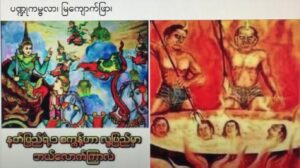An homage to Zawgyi’s timeless poem, reimagined in the spirit of Daw Aung San Suu Kyi’s journey
By DARZKKG for MMNN
Introduction:
The name Zawgyi (1907–1990) shines among the greatest luminaries of modern Burmese literature. A poet, scholar, and translator, he was a pioneering figure in introducing Western literary styles to Burmese poetry while preserving its lyrical soul. One of his most beloved creations is the symbolic and enduring poem series about “Ma Beda”, the graceful yet resilient water hyacinth (Eichhornia crassipes) that floats in the tidal streams of the Irrawaddy Delta.
In Zawgyi’s verse, Ma Beda becomes more than a flower — she is a metaphor for womanhood, for dignity in the face of hardship, and for the indomitable human spirit. She is bruised by the elements, kicked by ducks (stand-ins for the cruelty and indifference of society), and repeatedly swept under — yet always rises, still proudly wearing her flower.
Many Burmese readers, especially women and those facing political or personal turmoil, have drawn strength from Ma Beda’s quiet defiance. For those of us reflecting on the life of Daw Aung San Suu Kyi, once the icon of democratic resistance, Zawgyi’s Ma Beda offers an apt allegory. She, too, was once gracefully afloat above the tide of history, then battered by betrayal and power, yet may still one day rise — not for personal glory, but to inspire a people once more.
The following is a poetic English adaptation of Zawgyi’s “Ma Beda”, reimagined in light of DASSK’s journey — from being the beloved daughter of Burma’s hero, to a Nobel Laureate under house arrest, to a leader navigating impossible compromises, and now a prisoner once again of the same tides that once lifted her.
Ma Beda – Still Wearing Her Flower
(After Zawgyi, with reflections on Daw Aung San Suu Kyi)
In moon-kissed creeks where tides do play,
Floats Miss Beda, washed far away—
A violet bloom adrift and fair,
With jasmine dreams pinned in her hair.
She longed to rest by gentle shore,
But waves betrayed and pulled once more.
A coconut husk came striking by,
And bruised her side beneath the sky.
No shelter found, no easy grace—
Just swirling currents, ruthless pace.
Dragged down again, denied her claim,
Yet rose she did, though not the same.
To float again—no simple feat—
The stream grows fierce, the ducks compete.
A hundred peck and splash and bite,
But still she glides, holding her right.
Alone she bears the rough assault,
And none but her can halt the fault.
She bites her lip, but does not break—
Still wears her flower, make no mistake.
With neither crown nor gold nor cheer,
No chorus sings, no allies near.
Yet in her poise, her quiet stance,
She claims her truth: a second chance.
O tides may drown, and thrones may fall,
But Ma Beda outlasts them all.
She doesn’t rule with sword or flame—
She floats, she bears, she earns her name.
“This is my way,” the flower says,
“Through storms and stings and silent days.
No puppet’s path, nor easy fame—
But still afloat. And still the same.”
Epilogue:
Just like Ma Beda, Daw Aung San Suu Kyi was not always perfect — but she endured what few could. Tossed by fate, worshipped, criticized, and used, she is now once more in the dark waters of repression. Yet if she ever rises again, wiser and scarred, let us remember: even a flower torn by tide can teach us more about resilience than any banner or crown.
May this poem remind Myanmar’s youth and all readers that true strength is not loud, nor adorned with medals. Sometimes, it is quiet. Sometimes, it is a violet hyacinth still wearing its flower.
I got this better translation later. Above was my translation.
Source of poem below- “Keep on flowing Ayeyarwaddy…”- anthology of the Myanmar Poetry –
Zaw Gyi : Hyacinth’s Way – This is My Way
Rejoicing in the tidal creek, the blue coloured Miss Beda,
Giving pretext of the jasmine flower,
She wants to dock at the shore near.
Rejoicing in the tidal creek, Miss Beda of a bluish colour,
Giving pretext of the belle lady,
She fancies to stop at the shore here.
Rejoicing in the tidal creek, bluish Miss Beda,
Giving pretext of the small stupa,
She desires to land at the shore hither.
With a sail aloft while I glide,
The words of the piper I have learned to abide,
Wearing like a sash the noble wish of escape, bluish lady
Beda
Flowing up and dawn in the tidal creek’s water,
She says, this is my way; no other.
– Noble wish of escape.
The wish of escape from endless births of Samsara, and
taking the other way round, it means the attainment of Nirvana
ပန်းပန်လျက်ပါ”
ညိုပြာပြာ၊ လတာပြင့်ခြေရင်း။
လှိုင်းတက်ရာ ဗေဒါတက် လှိုင်းသက်ရာဆင်း။
ဆင်းရလဲမသက်သာ။
အုန်းလက်ကြွေ ရေပေါလော၊ မျောစုန်လို့လာ။
အဆင်းနဲ့အလာ၊ မဗေဒါအထွေး။
အုန်းလက်ကြွေ သူနံ့ဘေး ဆောင့်ခဲ့ရသေး။
ဆောင့်ခဲ့လဲမသက်သာ။
နောက်တချီ ဒီတလုံးက ဖုံးလိုက်ပြန်ပါ။
မြှုပ်လေပေါ့ ပေါ်မလာ၊ မဗေဒါ အလှ။
တလံကွာ လှိုင်းအကြွ၊ ပေါ်လိုက်ပြန်ရ။
ပေါ်ပြန်လဲ မသက်သာ။
ချောင်းအဆွယ် မြောင်းငယ်ထဲက၊ဘဲထွက်လို့လာ။
ဘဲအုပ်မှာ တရာနှစ်ရာ၊ ဗေဒါတပင်ထဲ။
အယက်အကန်ခံလို့
ဗေဒါပုံ အံကိုခဲ၊ ပန်းပန်လျက်ဘဲ။ ။
“ဗေဒါလမ်း” သီချင်း
ညိုပြာပြာ လတာပြင်ခြေရင်း
လှိုင်းတက်ရာ ဗေဒါတက်၊ လှိုင်းသက်ရာဆင်း။
ဆင်းရလဲ မသက်သာ
အုန်းလက်ကြွေရေပေါလော၊ မျောစုန်လို့လာ
အဆင်းနဲ့အလာ၊ ဗေဒါမ အထွေး
အုန်းလက်ကြွေ သူ့နံဘေး၊ ဆောင့်ခဲ့ရသေး။
ဆောင့်ခဲ့လဲ မသက်သာ
နောက်တချီ ဒီတလုံးက၊ ဖုံးလိုက်ပြန်ပါ
မြုပ်လေပေါ့ ပေါ်မလာ၊ မဗေဒါအလှ
တလံကွာ လှိုင်းအကြွ၊ ပေါ်လိုက်ပြန်ရ။
ပေါ်ပြန်လဲ မသက်သာ
ချောင်းအဆွယ် မြောင်းငယ်ထဲက၊ ဘဲထွက်လို့လာ
ဘဲအုပ်မှာ တရာနှစ်ရာ၊ ဗေဒါက တပင်ထဲ
အယက်အကန်ခံလို့
ဗေဒါပျံအံကိုခဲ၊ ပန်းပန်လျက်ဘဲ။ ။ (ဇော်ဂျီ – တက္ကသိုလ် အိုးဝေမဂ္ဂဇင်း၊ ၁၉၆၀)








